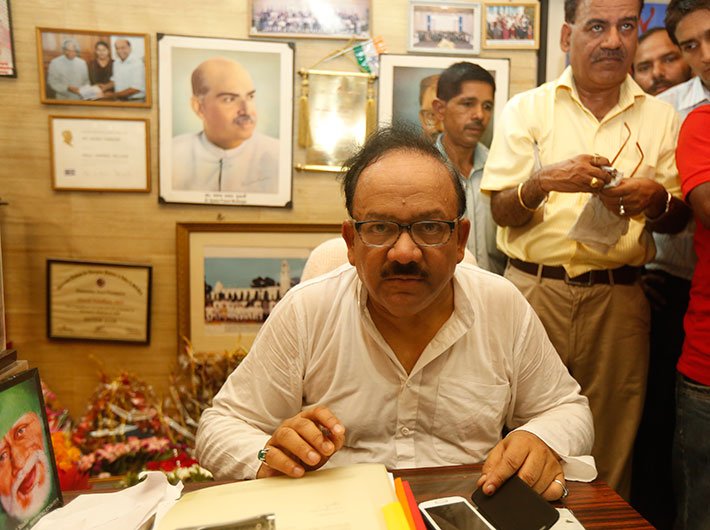A medical practitioner-turned-politician, Dr Harsh Vardhan got cracking in his new role as the union health minister as soon as he assumed office. Besides promising better health care facilities and making regular rounds of key hospitals, the Lok Sabha MP from Chandni Chowk, Delhi, has also written to finance minister Arun Jaitley seeking to remove tax exemption granted to beedi manufactures and suggesting a steep increase in taxes on cigarettes. In an interview with Pankaj Kumar, Dr Harsh Vardhan explains how he plans to improve health facilities in the country. Excerpts:
We have the universal health coverage plan to ensure proper health care. How are you going to make it more effective, considering India allocates only a little more than 1 percent of GDP on the health sector?
We are consulting experts and trying to study all schemes across the country as well as health schemes (implemented) all over the world. Our expert group will subsequently finalise the mechanism to initiate a proper scheme so that the maximum number of people get benefits. I am meeting (health) ministry officials and chalking out focus areas, as it is the duty of every government to provide a proper health care to the people.
I am a medical professional and my expertise and experience as a health minister in Delhi and otherwise in the medical profession will help me handle the ministry better.
India ranks 171st among 175 countries in terms of public health expenditure. Are you going to demand more funds for the sector since you follow the dictum ‘health is more important than wealth’?
We will certainly request the finance minister to increase allocation for health as we believe strongly that the health budget is grossly deficient.
Data suggests that 39 million people are forced into poverty every year due to high medical expenditure. Also, out-of-pocket expenditure is very high – and then out of 78 percent health expenditure, 74 percent is spent on drugs alone. How do you plan to address this?
I am trying to ensure that all poor people in the country get some essential drugs free of cost at all health facilities. We are going to ensure a process of implementation of rational use of drugs programme for the country.
The quality of drugs is also a major concern. Recently the US food and drug administration banned some Indian drugs over quality issues. Another pertinent subject is irrational use of medicines, besides huge production of hazardous and inessential medicines.
We are working out a comprehensive programme on various aspects of health and we will let the people know as soon as we finalise it. Let me assure the people that we are consulting experts of international repute from India as well as abroad and health is high on this government’s priority list.
While the ideal doctor-patient ratio should be 1:1,000 according to WHO, it is 1:2,000 in India. How are we going to meet this deficit if more colleges are not given permission or seats are not increased in the present institutions?
We have received complaints against the medical council of India (MCI) and are examining it. The vast gap between India’s population and the number of doctors has to be reduced keeping in view the quality of medical education. We are working on a process of overall reforms in medical education.
It (complaints against MCI) is a very serious issue and we are going to change the thinking, vision and working style of the MCI because total percent transparency in the system is need of the hour.
How are you planning to clean up the system? Do you have any specific strategies in mind?
We are concentrating on e-governance. The idea is to give a corruption-free and transparent administration.
You plan to set up AIIMS-like institutions across the country? How many states will have such facilities?
We are finalising the number of states where we can open AIIMS-type institutions. We are in consultation with the state governments that are ready to allot land for this.
We recently received a request from Andhra Pradesh and we have asked them to identify the land required (to set up any such institution). We are concerned for other states as well and are trying to expedite work on the six new AIIMS. This is being done under the pradhan mantri swasthya suraksha yojana (PMSSY) to correct regional imbalances in health care in the underserved areas of the country.
What will you do to fight preventable diseases like encephalitis which claims so many lives year after year?
We have asked officials to do complete immunisation of children. We have asked officials to indentify districts in Bihar and Uttar Pradesh so that remedial measures can be taken to eradicate it completely like polio.
(This interview was first published in July 1-15, 2014 issue of Governance Now.)

